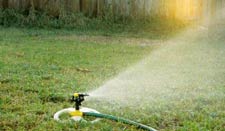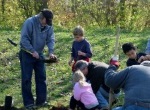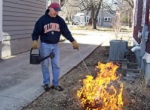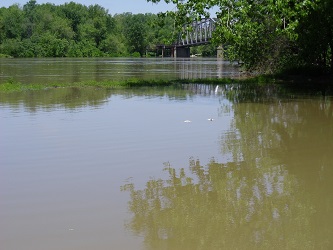Water Conservation at the Community Level
Last Reviewed: May 18, 2024
Why is water conservation important? That seems like a fair question. Doesn't the water we use circulate into and out of us, up through evaporation and down as rain, around the globe? That's what some teacher said when she taught me about the hydrologic cycle.
In areas where drinking water supply is abundant, you're probably only hearing about water conservation during a presentation about green living in general. But in other areas, where there is an existing or potential water shortage, folks may be much more aware of the idea of water efficiency. You can use your neighborhood association or homeowner association meeting to give information about current or potential shortages, and to inspire and inform about water conservation.
We also encourage neighborhoods to use some of their clout at city hall to push for water-saving measures in the public sector.

Here are the main points about why water conservation is relevant to your community:
- Energy conservation. This is important wherever you live. We think that this should be your main argument unless there's plenty of chatter about water shortage in your territory. The purification of water requires a substantial amount of energy. Depending on the topography, pumping it from here to there also may be energy-intensive. Then the treatment of wastewater totes up another big energy bill. In many places these drinking water and wastewater treatment prices are artificially low to the home owner, but that condition can't persist forever.
- Habitat for fish and wildlife. When people withdraw less surface water, there is more available for the freshwater fish, migrating birds, and other species that depend on that water. Tampering with entire ecosystems to deliver an excessive water supply to humans is sure to lead to undesirable and unintended consequences.
- Shortages in safe drinking water supplies for certain populations. While overall the earth might not be in danger of running out of water, there are many acute shortages in particular locations. Extreme weather conditions that accompany climate change are likely to aggravate that situation for cities in dry climates.
Shortages again will lead to higher costs for pumping water to the large and small plants where it is purified for human consumption. Longer transports of water from its source to the purification plant and the ultimate distribution system of course will be more expensive than shorter hauls.
Drama and Laughter Needed in Talking about Water Efficiency
Water conservation does sound a little dull, and even the newer term, water efficiency, does not sounds riveting.
So here are some ideas about how to communicate with your neighborhood about this issue.
• Figure out exactly what those costs of treating drinking water and wastewater are, and then convert those numbers to an "average household" figure. You'll need some pretty graphics and a vivid imagination about challenging citizens to consider what else they could buy with the amount of money that the two types of treatment cost. Every year, is your family giving up one steak dinner, a cheeseburger a week, an iPod, or what?
• I don't know what's going to be really funny about water conservation, but somewhere a comedian in your town is waiting to bust loose. If Drippy the Drip or Wanda Water Waster can't make people laugh, you'll have to invent your own cartoon characters. Balloons coming out of their heads say clever things about water conservation.
Ask the kids too what is funny or exciting about saving water. They could surprise you with their clever ideas.
A more subtle way to think about water conservation is to think about water efficiency. If we can achieve a result with the minimum amount of water possible, that's water efficiency. No one is asking you not to accomplish what's needed, so you don't have to go around with dirty clothes. Just make a game of cleaning your clothes with the least possible amount of water.
For your community as a whole, if you treat and deliver your own water supply, here's how to increase water efficiency:
• Meter the water and charge users according to usage. Some rate structures reward water use rather than water efficiency, so look at the financial incentives. If you're in a smaller town that has always charged a flat rate, this can be a tough political battle. But it's very fair to pay according to use, and to try to keep the system as small as possible by penalizing overuse.
• Identify where water is leaking throughout the processing and delivery system, using computer-assisted leak detection equipment, and repair those leaks. City councils and neighborhood leaders may be astounded to learn about the amount that is leaking.
• Pipe cleaning, lining, and repairs may be necessary at any stage along the water delivery system, but of course larger pipes (or larger leaks) should be higher priority repairs.
• Consider whether seasonal pricing might be an effective deterrent to watering plants with treated drinking water, or irrigating the lawn at high noon.
• Work with commercial users on an individual basis, beginning with the largest users first, to see how they can both save water and save money. Audit where water is now being used. Encourage them to investigate methods of using "graywater," such as water from washing vegetables or dishes, for some purposes.
• If the large user is a public park or golf course, change your landscape over time so that less and less water is necessary. Parks can be beautiful if parts of them are converted to native plant landscapes, such as prairie or whatever is applicable in your region. Your park department also could save money by practicing or demonstrating xeriscape, which means plant selection so that no irrigation is necessary. Also parks can group plants according to their water needs, so that beds do not require excess watering to meet the needs of only one plant in them. We know that water conservation is a hard sell for golf courses, but even there some measures may be possible.
• Retrofit public buildings with low-water aerators on faucets, and replace flapper valves. If you have showers, low-flow showerheads should be a high priority. Model landscaping efficiency, and if you are in a city large enough to be able to do so, provide information to your citizens about low water usage plants.
• Coordinate with the folks who keep track of your zoning regulations to give disincentives for grass turf maintenance, rather than requiring lawn. Many attractive residential landscapes contain little to no turf grass, so at least make it possible for those who want a different look to have it. But some zoning ordinances actually require lawn in a percentage of the outdoor area.
• Consider reducing water pressure in parts of town where pressure is higher than needed. For instance, a residence typically doesn't need pressure more than 80 psi. This promotes water conservation by reducing spills and gushes when kids turn on the faucet too far, and so forth.
• Make it illegal to irrigate at peak times of the day. Typically outdoor usage drives peak water demand, so when you reduce outdoor usage through any method, you reduce the potential for needing to add more water treatment capacity. You can expand on this idea by making car washing, filling private swimming pools, and hosing off sidewalks illegal at certain times of day or week. And for more reasons than one, make sure private pools don't leak.
• Educate your citizens, through pamphlets, websites, or a short tip on each month's bill. Make sure teachers are presenting the reasons to be vigilant about water conservation. Below we're placing a few tips to get you started, but any environmentalists in your community can spout off a long list of things to do or not do. Just don't make it so forbidding it sounds like people can never have any fun.
Individual and Household Water Conservation Tips for Neighborhood Association Programs
Your neighborhood association might reasonably hold a program about water usage at the household level. In a larger city, you could find a speaker from a local utility, environmental organization, botanical garden, or university. If you can't identify a good speaker, start working on your own program based on the tips below.
• Repair leaky faucets. A steady but small drip might mount up to 20 gallons of water a day!
• Consider replacement of old washers, showerheads, toilets, and sinks that pre-date water conservation oriented appliances and fixtures. Keep in mind that in the average home, about three-fourths of the water is used in bathrooms.
• Do not leave the water running in any circumstances where it isn't necessary. Where you grew up, you might have learned to leave the water on all the time while you're brushing your teeth, washing the potatoes, or rinsing the hand-washed dishes. But you can change. It only takes 21-28 days to break a habit.
• Minimize lawn watering. When you must water, do so in the early morning, water enough to do some good, and try to choose a still day instead of a windy one. And definitely don't water your sidewalk. You can now purchase some attractive rain barrels, so teach neighborhood residents about catching the water running off roofs for later distribution onto lawns.
• Choose plants that require minimal water.
• Use the clothes washer and dishwasher only when full. And use your garbage disposal as little as possible.
• Reduce the length of your showers. Yes, it's possible. You probably don't need water therapy to survive, or even to relax. It actually takes a very short amount of time to cleanse yourself; the rest is meeting some other need.
• Cut down on frequent car washing, boat washing, and any other large use of water that's mostly for the sake of vanity.
• The really simple check for leaks in the home system is to check your water meter when you know you can do without water for a couple of hours, then don't run any water for that period of time. Then check to see if the meter has moved. If so, somewhere your system is leaking and not giving you any benefit.
• Consider replacing paved driveways with a permeable surface. Permeable means the water can flow through it. Both permeable asphalt, which may be called porous or pervious asphalt, and permeable concrete are available now. Attractive permeable pavers could replace old patios.
These will give you some ideas if you find yourself in need of a program for your community association. Some of these may generate considerable discussion and pushback, so be prepared for a lively session if you encourage audience participation. We always do.
Read About More Topics Relevant to Water Conservation
- Making and Keeping a Good Community >
- Community Challenges, Topics & Concepts >
- Sustainability > Water Conservation
Join GOOD COMMUNITY PLUS, which provides you monthly with short features or tips about timely topics for neighborhoods, towns and cities, community organizations, and rural or small town environments. Unsubscribe any time. Give it a try.



